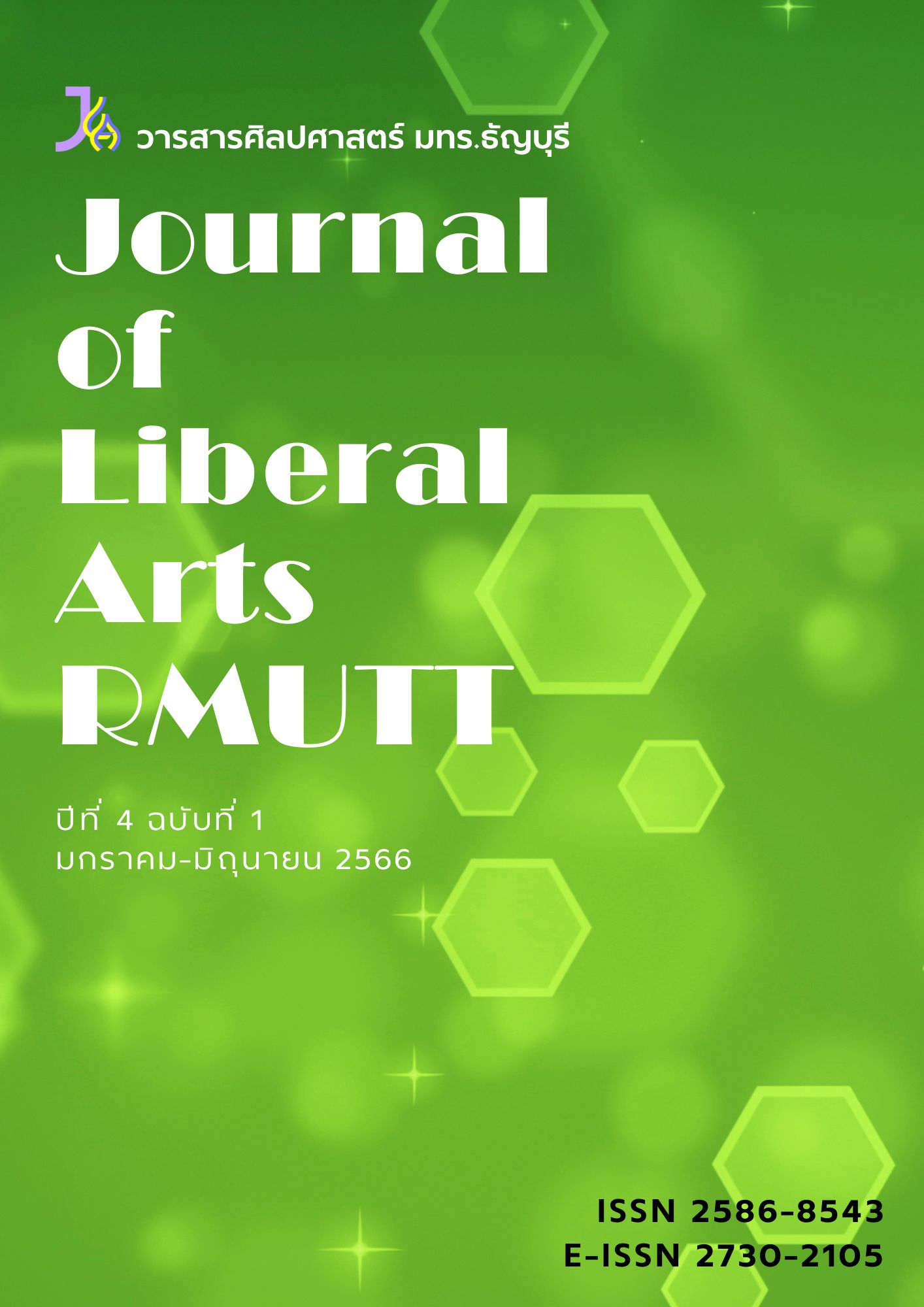รูปแบบธุรกิจโรงแรมอัจฉริยะสำหรับนักเดินทางเพื่อธุรกิจ: การเปลี่ยนแปลงของธุรกิจโรงแรมในบริบทโลกยุคใหม่
คำสำคัญ:
โรงแรมอัจฉริยะ , นวัตกรรมการบริการ , การพัฒนาเทคโนโลยีบทคัดย่อ
ธุรกิจโรงแรมเป็นภาคีวิวัฒนาการที่ก้าวหน้าอย่างต่อเนื่อง ผู้ประกอบการหลายรายหมุนเวียนเพื่อสร้างความแตกต่างและความได้เปรียบในการแข่งขัน โดยใช้เทคโนโลยีเป็นเครื่องมือสำคัญ การนำเทคโนโลยีมาผสมผสานกับแนวคิดใหม่ในการบริการและพัฒนาการบริการ เป็นเอกลักษณ์ของโรงแรมอัจฉริยะ โรงแรมดังกล่าวสามารถตอบสนองต่อพฤติกรรมและความต้องการของนักท่องเที่ยวที่เปลี่ยนแปลงอย่างรวดเร็ว โดยเฉพาะกลุ่มนักเดินทางเพื่อธุรกิจในบริบทของโลกยุคใหม่ ที่มุ่งหาความสมดุลในการท่องเที่ยวและการทำงานพร้อมกัน ดังนั้นโมเดลธุรกิจโรงแรมอัจฉริยะเป็นแนวคิดที่เหมาะสมในยุคการเปลี่ยนแปลงผ่านเทคโนโลยีสมัยใหม่ ทั้งนี้การพัฒนาโมเดลนี้จำเป็นต้องให้ความสำคัญแก่พฤติกรรมของผู้บริโภค ความพร้อมทางเทคโนโลยี และการยอมรับเทคโนโลยีเพิ่มเป็นปัจจัยสำคัญที่ส่งผลต่อคุณภาพการบริการของโรงแรม เช่น การสร้างประสบการณ์และความพึงพอใจของลูกค้า โดยทั้งหมดนี้เป็นกลไกที่สะท้อนถึงความสามารถในการพัฒนาธุรกิจโรงแรมภายใต้สถานการณ์เปลี่ยนแปลงของธุรกิจโรงแรมในยุคใหม่ และมีความเหมาะสมในบริบทของการเปลี่ยนแปลงผ่านเทคโนโลยีสมัยใหม่
เอกสารอ้างอิง
กรมการท่องเที่ยว. (2566). Trend & Style กระแสท่องเที่ยวแบบไหน โดนใจนักท่องเที่ยวปี 2566. สืบค้น 25 มกราคม 2566, จาก https://www.facebook.com/Deptourism/
เจริญชัย เอกมาไพศาล. (2564). การจัดการบริการของธุรกิจการท่องเที่ยวและบริการ. กรุงเทพฯ: สถาบันบัณฑิตพัฒนบริหารศาสตร์.
จิตรลดา พันธุ์พณาสกุล และวรลักษณ์ ลลิตศศิวิมล. (2562). การสร้างความได้เปรียทางการแข่งขันด้วยเทคโนโลยีสารสนเทศ และนวัตกรรมของธุรกิจโรงแรมในประเทศไทย: การทบทวนวรรณกรรม. วารสารบริหารธุรกิจเทคโนโลยีมหานคร, 16(2), 19-39.
จุฑาพร บุญคีรีรัฐ และณัฐภาณี จริตไทย. (2563). การเปลี่ยนแปลงรูปแบบการท่องเที่ยวกับเทคโนโลยีสารสนเทศบนโลก ดิจิทัล. วารสารปัญญาภิวัฒน์, 12(2), 285-301.
ชนินทร์ พุ่มบัณฑิต. (2564). From High – Touch to High-Tech: นวัตกรรมขับเคลื่อนอุตสาหกรรมโรงแรม. BU Academic Review, 20(2), 173-184.
ทศพร มะหะมัด และมนัส สิทธิการ. (2563). ปัญญาประดิษฐ์การจัดการทรัพยากรบุคคลสมัยใหม่ในองค์กร. RMUTT Global Business and Economics Review, 15(1), 75-89.
ธงไชย สุรินทร์วรางกูล และสุธา พงศ์ถาวรภิญโญ. (2560). ธุรกิจโรงแรมในพื้นที่กรุงเทพมหานครกับการใช้เทคโนโลยีสารสนเทศเพื่อการตลาดและการส่งเสริมการขาย. วารสารวิชาการการจัดการเทคโนโลยีสารสนเทศและ นวัตกรรม, 4(1), 75-83.
ธนาคารไทยพาณิชย์. (2565). รู้จัก “Bleisure” เทรนด์มาแรงในธุรกิจท่องเที่ยว. สืบค้น 12 มกราคม 2566, จาก https://www.scb.co.th/th/personal-banking/stories/business- maker/bleisure.html
ธนาคารทหารไทยธนชาต. (2566). ttb analytics คาดรายได้การท่องเที่ยวไทยปี 2566 เพิ่มขึ้น 1 ล้านล้านบาทจากปีก่อน. สืบค้น 20 มกราคม 2566, จาก https://www.ttbbank.com/th/newsroom/detail/travel-thailand-2566
ธาดา สมานิ. (2562). นวัตกรรมบริการของอุตสาหกรรมโรงแรมไทย. วารสารการบริการและการท่องเที่ยวไทย, 14(1), 103 – 110.
วริทธิ์นันท์ โฆษิตเจริญสุข. (2565). ธุรกิจโรงแรมจะเดินต่ออย่างไร…เมื่อนักท่องเที่ยวอาจไม่เหมือนเดิม. สืบค้น 15 มกราคม 2566, จาก https://www.scbeic.com/th/detail/product/hotel_131222
วลัยลักษณ์ รัตนวงศ์, ณัฐธิดา สุวรรณโณ, และอนุ เจริญวงศ์ระยับ. (2555). ปัจจัยที่ส่งผลต่อนวัตกรรมการบริการสำหรับธุรกิจท่องเที่ยวของประเทศไทย. วารสารสหวิทยาการวิจัยฉบับบัณฑิตศึกษา, 1(1), 61-68.
ศูนย์พัฒนาวิชาการด้านตลาดการท่องเที่ยว. (2566). ไม่ใช่เท่าเดิมแต่ต้องดีกว่าความคาดหวังต่อโรงแรมที่พักของนักท่องเที่ยวหัลังยุคโควิด-19. สืบค้น 30 มีนาคม 2566, จาก https://tatacademy.com/th/publish/articles
สำนักเลขาธิการนายกรัฐมนตรี. (2566). ครม. เห็นชอบแผนพัฒนาการท่องเที่ยวแห่งชาติฉบับที่ 3 พ.ศ. 2566-70. สืบค้น 25 มกราคม 2566, จาก https://www.thaigov.go.th/news/contents/details/63364
อมรรักษ์ สวนชูผล. (2563). การจัดการองค์กรธุรกิจกับปัญญาประดิษฐ์เพื่อความอยู่รอดทางธุรกิจ. วารสารวไลยอลงกรณ์ปริทัศน์ (มนุษยศาสตร์และสังคมศาสตร์), 10(3), 155-164.
อัญชิสา ชูศรี. (2557). นวัตกรรมบริการการแสดงความรับผิดชอบต่อสังคมและการตลาดแบบปากต่อปากที่ส่งผลต่อการตัดสินใจเข้ารับบริการหอผู้ป่วยโรงพยาบาลเอกชนในเขตกรุงเทพมหานคร. (การค้นคว้าอิสระปริญญา บริหารธุรกิจบัณฑิต). มหาวิทยาลัยกรุงเทพ, กรุงเทพฯ. สืบค้น 20 มกราคม 2566, จาก
http://dspace.bu.ac.th/handle/123456789/1915
Bazzano, F., & Lamberti, F. (2018). Human-robot interfaces for interactive receptionist systems and way finding applications. Robotics, 7(3), 56.
Choi, Y., Oh, M., Choi, M., & Kim, S. (2021). Exploring the influence of culture on tourist experiences with robots in service delivery environment. Current Issues Tourism, 24, 717–733.
Ding, J., Lin, R. Z., & Lin, Z. Y. (2018). Service robot system with integration of wearable Myoarm band for specialized hand gesture human–computer interfaces for people with disabilities with mobility problems. Computers & Electrical Engineering, 69, 815-827.
Furseth, P. I., & Cuthbertson, R. (2013). The service innovation triangle: a tool for exploring value creation through service innovation. International Journal of Technology Marketing, 8(2), 159-176.
Go, H., Kang, M., & Suh, S.C. (2020). Machine learning of robots in tourism and hospitality: Interactive technology acceptance model (iTAM) Cutting edge. Tourism Review, 75, 625–636.
Herédia-Colaço, V., & Rodrigues, H. (2021). Hosting in turbulent times: Hoteliers’ perceptions and strategies to recover from the Covid-19 pandemic. International Journal of Hospitality Management, 94(4), 1-12.
Jaremen, D., Jędrasiak, M., & Rapacz, A. (2016). The concept of smart hotels as an innovation on the hospitality industry market-case study of Puro Hotel in Wrocław. Economic Problems of Tourism, 36(4), 65-75
Kaushik, A. K., Agrawal, A. K., & Rahman, Z. (2015). Tourist behavior towards self-service hotel technology adoption: Trust and subjective norm as key antecedents. Tourism Management Perspectives, 16, 278-289.
Kim, J. J., & Han, H. (2022). Hotel Service Innovation with Smart Technologies: Exploring Consumers’ Readiness and Behaviors. Sustainability, 14(10), 5746.
Lei, C., Wong, E., Gao, X., & Gao, Y. (2021). The Effects of AI Robot Service on Hotel Customer’s Service Experience Satisfaction and Repurchase Intention. Forest Chemicals Review, 896-915.
Luo, X., & Pan, Y. (2021). A Study on the Customer Experience Design through analyzing Smart Hotels in China. Journal of the Korea Convergence Society, 12(3), 115-124.
Meidute-Kavaliauskiene, I., Çiğdem, Ş., Yıldız, B., & Davidavicius, S. (2021). The Effect of Perceptions on Service Robot Usage Intention: A Survey Study in the Service Sector. Sustainability, 13, 9655.
MICE Intelligence Team. (2020). ทำความรู้จักกับ “Bleisure Travel” เทรนด์การเดินทางที่ผสมผสานเรื่องธุรกิจและ การพักผ่อนเข้าไว้ด้วยกัน. สืบค้น 15 มกราคม 2566, จากhttps://intelligence.businesseventsthailand.com/en/blog/bleisure-travel
Miočić, B. K., Korona, L. Z., & Matešić, M. (2012). Adoption of smart technology in Croatian hotels. In 2012 Proceedings of the 35th International Convention MIPRO. (pp. 1440 – 1445).: IEEE.
Murphy, J., Gretzel, U., & Pesonen, J. (2019). Marketing robot services in hospitality and tourism: The role of anthropomorphism. Journal of Travel Tourism Marketing, 36, 784–795.
Ramgade, A., & Kumar, A. (2021). Changing trends of hospitality industry: Emergence of millennials and gen Z as future customers and their influence on the hospitality industry. Vidyabharati International Interdisciplinary Research Journal, 12(1), 336-342.
Ramoly, N., Bouzeghoub, A., & Finance, B. (2018). A framework for service robots in smart home: an efficient solution for domestic healthcare. IRBM, 39(6), 413-420.
Rosete, A., Soares, B., Salvadorinho, J., Reis, J., & Amorim, M. (2020). Service robots in the hospitality industry: An exploratory literature review. In International Conference on Exploring Services Science (pp. 174-186). Springer: Cham.
Salim, I. M., & Sulaiman, M. (2011). Organizational learning, innovation and performance: A study of Malaysian small and medium sized enterprises. International Journal of Business and Management, 6(12), 118.
Seyitoglu, F., & Ivanov, S. (2020). A conceptual framework of the service delivery system design for hospitality firms in the (post-) viral world: The role of service robots. International Journal of Hospitality Management, 91, 102661.
Sharma, D. (2016). Enhancing customer experience using technological innovations: A study of the Indian hotel industry. Worldwide Hospitality and Tourism Themes, 8(4), 469 - 480.
Shin, K., & Kang, J. (2020). Reducing perceived health risk to attract hotel customers in the COVID-19 pandemic era: Focused on technology innovation for social distancing and cleanliness. International Journal of Hospitality Management, 91, 1-9.
Starcevic, S., &Konjikusic, S. (2018), Why Millennials as Digital Travelers Transformed Marketing Strategy in Tourism Industry, International Thematic Monograph Tourism in Function of Development of the Republic of Serbia-Tourism in the Era of Digital Transformation. University of Kragujevac.
World Health Organization. (2022). WHO Coronavirus (COVID-19) Dashboard. Retrieved April 17, 2023, from https://covid19.who.int/
Xu, X. (2018). Research on the construction and development of smart hotel from the perspective of serving customers. In 2018 2nd International Conference on Education Science and Economic Management (ICESEM 2018) (pp. 975-978). Atlantis Press.
ดาวน์โหลด
เผยแพร่แล้ว
รูปแบบการอ้างอิง
ฉบับ
ประเภทบทความ
สัญญาอนุญาต
ลิขสิทธิ์ (c) 2023 วารสารศิลปศาสตร์ มทร.ธัญบุรี

อนุญาตภายใต้เงื่อนไข Creative Commons Attribution-NonCommercial-NoDerivatives 4.0 International License.









